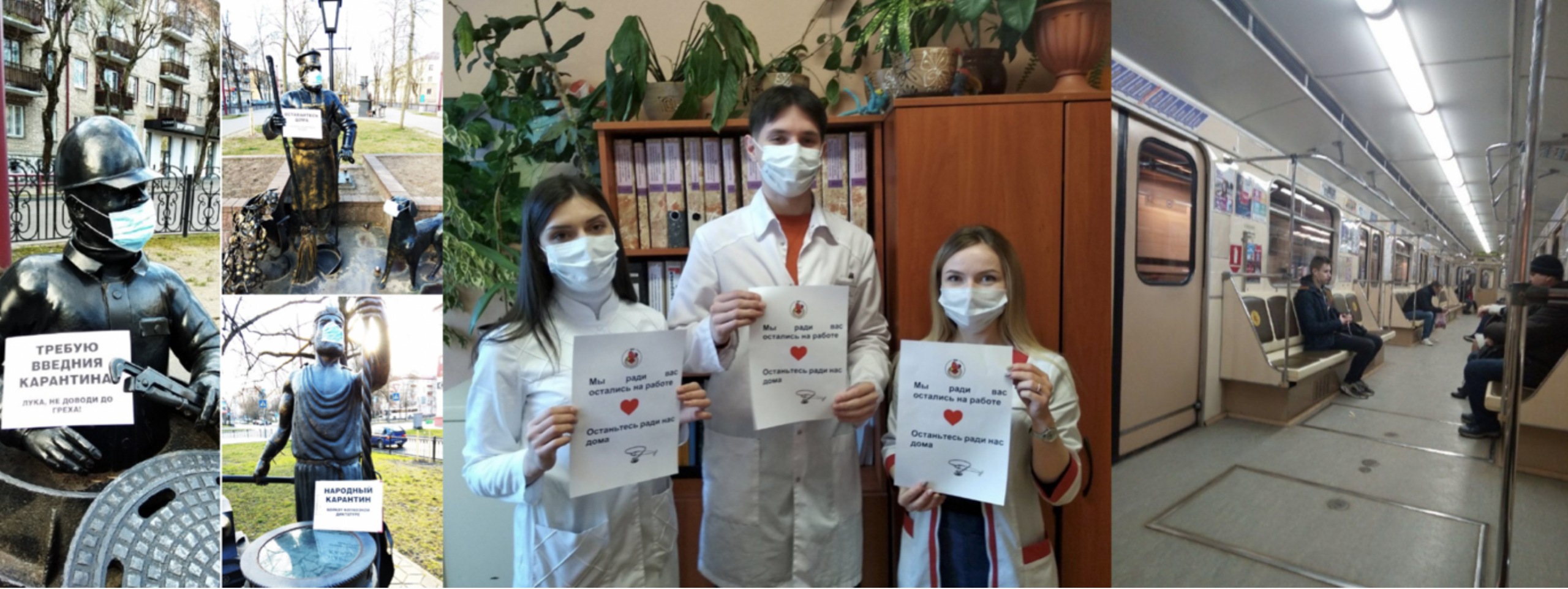The “People’s Quarantine” — Belarusians promote social distancing despite Lukashenko’s ignorance
Belarusian society is managing self-quarantine despite lack of nationwide measures to prevent spread ofCOVID-19
The “People’s Quarantine” — Belarusians promote social distancing despite Lukashenko’s ignorance

Belarusian society is managing self-quarantine despite lack of nationwide measures to prevent spread of COVID-19

In the absence of government-imposed social distancing measures, Belarusian opposition activists have launched an online grassroots campaigns to advocate for self-quarantine. The campaign indicated that Belarusian society has chosen not to rely on state officials to protect it from the pandemic, and that activists are prepared to risk penalties for absence from classes and work.
Unlike many other European countries, Belarus has not announced a nationwide quarantine to prevent the spread of COVID-19. President Aleksander Lukashenko called the pandemic a “psychosis” and offered to treat the virus with a “tractor and some vodka.” Belarus is also the only European country that will hold Premier League soccer games despite the COVID-19 outbreak. Lukashenko is sometimes called the “last dictator in Europe,” as there are no free and fair elections in Belarus.
Belarusian government officials have not been fully transparent in their response to the pandemic, and that has bred distrust among the public. For instance, the Ministry of Health has refused to report the cities in which people were diagnosed with COVID-19, citing the desire to avoid “panic” among the media. Meanwhile, social media users are self-reporting COVID-19 cases via photos with emergency medical workers in protective suits. The relatives of a woman who recently died also disputed the Ministry of Health’s claims that she died from pneumonia, insisting that she instead died from COVID-19.
Grassroot initiatives
Students and medical workers in Belarus have been active advocates of social distancing.
On March 12, 2020 a user with the display name IGOR_6591A4 published a petition on the website Petitions.by which garnered 16,050 online signatures by March 27. The petition demanded that the Belarusian government introduce social distancing, COVID-19 testing, increased hygiene, and other preventive measures in the absence of a quarantine in Belarus’s schools and universities.

Belarus State University (BGU) had previously introduced a quarantine and distance learning from February 28 until March 9, after a foreign exchange student who tested positive returned on February 22.
Another online initiative that garnered significant engagement was a Facebook post by Maksim Ocheretniy, the chief medical officer of 3rd City Children’s Clinical Hospital, who called for people to stay at home. The post garnered 2,816 reactions, 258 comments and 3,002 shares.

In addition, two Belarusian programmers made a Telegram-based map for people in Belarus and abroad to mark themselves as “staying at home.” By March 27, more than 3,000 Telegram users had marked themselves on the map, with more than 2,200 of them in Minsk.

Belarus opposition boosts student initiatives
On March 20, four Belarusian activists from opposition parties and movements — one belonging to a labor union of radioelectric factory workers, a blogger, and a film director — announced the “People’s Quarantine,” a voluntary civic action movement that encouraged people to stay inside their homes from March 23 to April 5.
Open-source evidence on social media suggested that the notion of the “People’s Quarantine” had been floated about a week prior, on March 16. It first appeared in a Telegram post video that showed very few students attending a lecture at Minsk State Linguistic University (MGLU). The accompanying text read, “In MGLU many students did not go to a lecture. People’s Quarantine.” Two other Telegram channels, Paca-Vaca and Koronavirus | COVID-2019, forwarded the post to their audiences. Overall, the post garnered 81,000 views.

The idea was again revisited in a VKontakte group for MGLU students. A Telegram channel called Basta! then shared a screenshot from the post and Charter 97, a Belarusian pro-opposition media outlet, wrote an article about the initiative.

The VK post included a poll in which two-thirds of respondents voted to boycott classes while one-third voted to continue attending classes on March 23. The poll had 1,287 participants in total, including one vote cast by the DFRLab to reveal voting results.
On March 24, YouTube channel Sery Kot (Gray Cat), run by opposition activist Dmitry Kozlov, published a video showing empty halls at MGLU. The video garnered 2,331 views. Additionally, BGU students who were also members of the citizen-led initiative “European Belarus” (an organization that had co-signed the announcement of the “People’s Quarantine”) shared face masks in dormitories as a symbolic act.
Ministry of Health promotes medical worker’s flashmob
While the Ministry of Health attempted to ensure that everything was under control during a March 23 press conference, the next day it promoted a flashmob with Belarusian medical workers holding paper signs with the text, “We are working for you. Stay at home for us!” Earlier, a VK page called STOP LUKA (Stop Lukashenko) posted a compilation of photos from the event.

The effectiveness of the campaigns
While it is hard to assess the true effectiveness of the campaign, as older Belarusians tend to use social media less than younger ones, some evidence online suggested that typically crowded public gathering spots in Belarus were now significantly empty.
A few Twitter users reported a drop in the number of passengers using the Minsk metro.

Additionally, the Telegram channel Basta! corroborated evidence of empty metro cars in Minsk and reported on public banners calling for nationwide quarantine.

Although the Ministry of Health obeyed Lukashenko’s “no panic” policy, it ultimately supported medical workers who called for more aggressive social distancing measures among the public. The ministry is attempting to walk a fine line between obeying Lukashenko and promoting appropriate public health measures in the middle of a pandemic. Unfortunately, this balancing act may not be enough to contain the spread of COVID-19 in Belarus.
Follow along for more in-depth analysis from our #DigitalSherlocks.

